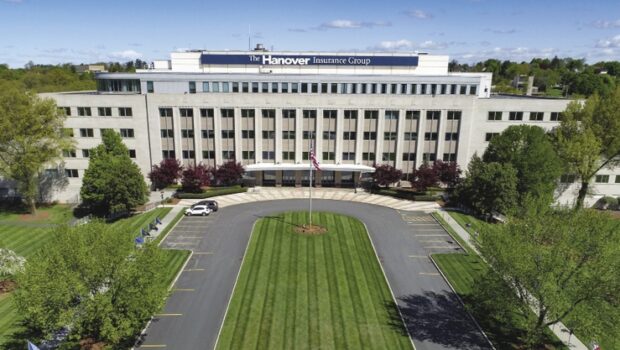By: David Sullivan
Director of Economic Development & Business Recruitment
WORCESTER – A recent study conducted by the Donahue Institute of Economic and Public Policy Research at UMass Amherst found that The Hanover Insurance Group, based in Worcester, contributes over $1.25 billion annually in statewide economic impact.
The Donahue Institute partnered with The Hanover to analyze the company’s impact between 2010 and 2020. The Hanover is not only one of the largest employers in Central Massachusetts but has played a pivotal role in the revitalization of the Hanover Theatre, CitySquare, and has contributed millions to local nonprofits and charities.
The Hanover was first founded in Worcester in 1852 and is a leader in property and casualty insurance. In 2021, the company wrote $5 billion of premiums and reported $419 million in revenue. The Hanover employs 4,400 people, with 1,675 based in Worcester at their 52-acre office park off Lincoln Street. The Hanover is the only publicly traded company headquartered in Worcester.
“We are more excited than ever about our future, and we are committed to making a lasting and positive difference, through our business and in our local communities, for many years to come,” said Jack Roche, President and CEO of The Hanover, in comments provided for the study.
The study by the UMass Donahue Institute found that the company has an annual economic output of $1.25 billion statewide. Of this total, $967 million goes to Central Massachusetts. Economic output is the company’s total value of production, measured by combining annual business profit, salaries paid, taxes paid, and capital expenses, while taking into account the revenue made possible by The Hanover’s services for end-users and clients.
Cumulatively across Massachusetts since 2010, this impact is estimated at $13 billion.
This does not take into account The Hanover’s key role in major economic development projects in Worcester’s downtown, or the charitable giving that the company makes a cornerstone of its operations.
In 2000, a group of local business and community leaders banded together to buy a neglected theatre along Main Street. With The Hanover’s leading role in securing financing, a $32 million renovation ensued and was completed in 2008. The company was the largest single donor, giving $5 million to the rehabilitation. Now, the 2,300-seat theatre has a new life as the Hanover Theatre for the Performing Arts, anchoring the downtown’s Theatre District. It is one of the busiest theatres in the region and books Broadway-quality shows regularly.
A similar opportunity to revitalize the downtown arose when the hulking Worcester Center Galleria mall was torn down in 2010. The mall, built in the 1960s on top of 34 acres of downtown businesses and buildings, languished for years before being demolished in favor of a master-planned campus of modern commercial and residential buildings called CitySquare.
“We’re proud to be an active member of the Worcester business community and thrilled to have the opportunity to work with so many dedicated and determined community partners, creating economic vitality for our region while helping to make it a better place in which to live and work,” said John C. Roche, president and chief executive officer at The Hanover. “We’re more excited than ever about the future of the Greater Worcester community and look forward to working with our employees and others to make a lasting and positive difference for many years to come.”
The Hanover, through its asset management arm Opus Investment Management, worked with the City of Worcester to parcel off the property, secure leases, and sell the property to developers. This resulted in the $565 million of public and private investment that made possible the Mercantile Center, the Unum office building, the AC Marriott, 110 Grill, Saint Vincent Hospital’s Cancer and Wellness Center, and the 145 Front Street apartments. The Hanover continued to play a significant role in CitySquare up until recently with the sale of the campus’s last available parcels to a developer in 2022.
“The Hanover-led projects at the theatre and CitySquare set the stage for what is possible for the city and reinforced how complicated projects can be successful when public and private sectors work together,” said Tim Murray, President & CEO of the Chamber who was Mayor of Worcester at the time of these initiatives.
This is all not to mention the charitable work by The Hanover, which has contributed over $16.5 million to nonprofits and community initiatives since 2010.
Recipients of The Hanover’s philanthropy include the YMCA, the YWCA, Worcester Public Schools, the EcoTarium, the Boys & Girls Club, the Central Mass Housing Alliance, and others. The Hanover also played a significant part in bringing the Worcester Red Sox to the city in their role as a founding sponsor of the team.
On top of all this, the company encourages employees to volunteer and contribute to the United Way of Central Massachusetts, which has resulted in $2.5 million in giving to the nonprofit since 2010.
The Donahue Institute’s study quantifies what many in Worcester already knew. The Hanover is a pillar of the local community and an exemplary corporate citizen and continues to prove it each year.





